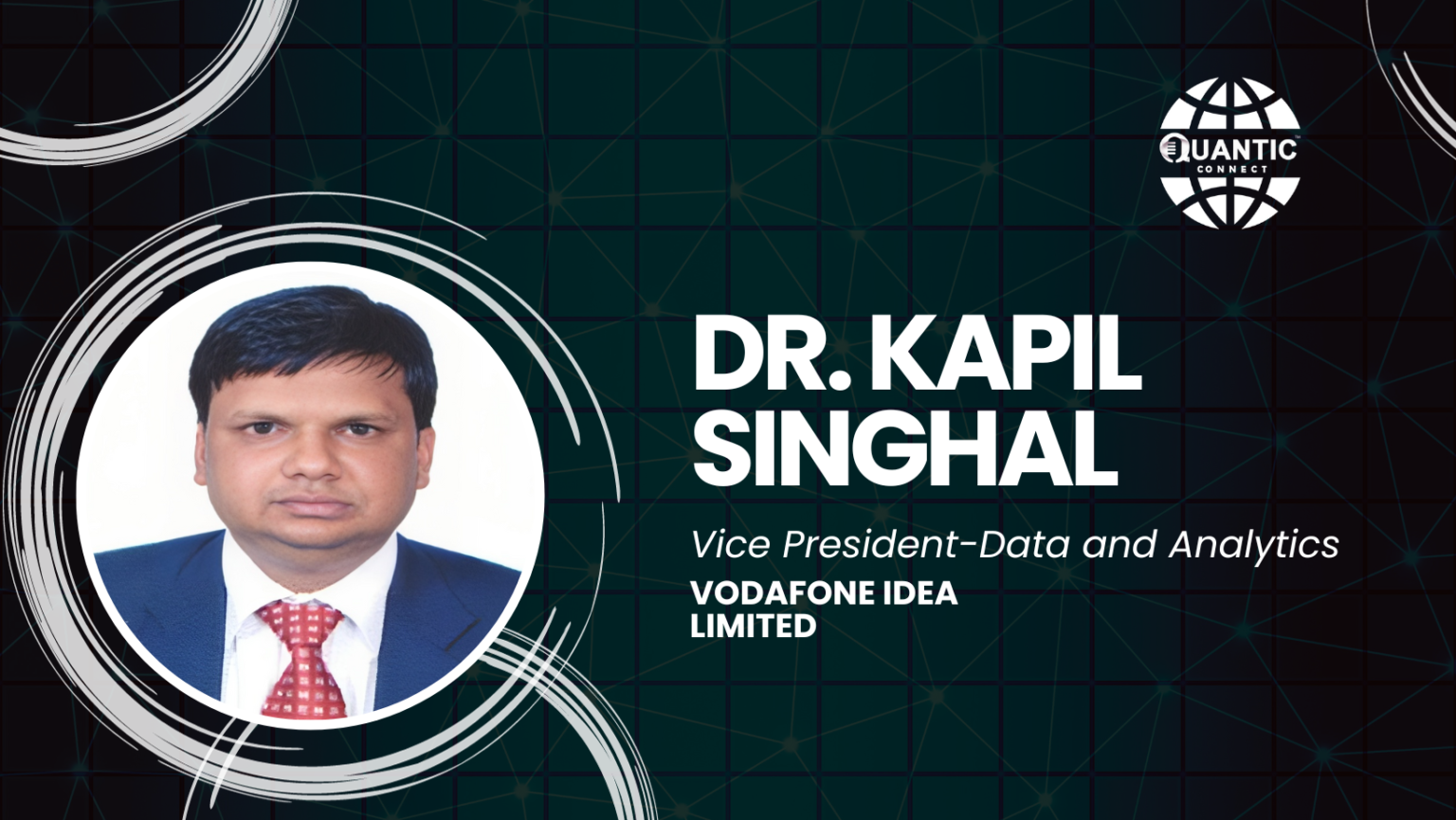Mumbai, December 20: Data Analytics in the telecommunications industry involves the systematic analysis of vast datasets to extract valuable insights and optimize network performance. It plays a crucial role in predicting and preventing network issues, improving customer experience, and enhancing overall operational efficiency. By leveraging advanced analytics tools, telecom companies can make informed decisions, optimize resource allocation, and proactively address challenges, ultimately leading to better service quality and increased customer satisfaction.
Join Dr. Kapil Singhal who is the Vice President-Data and Analytics for Vodafone Idea Limited in conversation with Mr. Marquis Fernandes, who spearheads the India Business at Quantic India, as they delve into the complex and the dynamic world of Data and its Analytics, where they highlight the motivation derived from virtues like curiosity and empiricism. The article delves into the application of advanced analytics techniques, AI, and ML in the telecom industry, showcasing instances of enhancing customer support, personalized experiences, and network optimization. It also outlines strategies for promoting a data-driven culture in telecom, emphasizing leadership commitment, careful metric selection, and employee training. The article concludes with advice for aspiring data professionals, emphasizing continuous learning, storytelling, simplicity in problem-solving, reproducibility, challenging the status quo, and self-awareness.
Dr. Kapil Singhal is an experienced Analytics, Data and Business Intelligence Leader with 21+ years of demonstrated history of working in multiple industries. Skilled in BI platforms, advance analytics, AI, ML and cloud solutions specializing in influencing data driven culture. As a Vice President (VP) and Head of the Data & Analytics (D&A) Practice at VIL, he lead the practice of Analytics /AI-ML / Data Science. Also partnering the vision of VIL to implement generative AI by implementing the first telecom LLM (Large Language Model) and enabling the Data as a service over a zettabyte of data lake house.
What motivates and drives your commitment to pursuing a career in data analytics, and how do you stay inspired in the ever-evolving landscape of data-driven technologies and applications?
I have started my career with “How can I find the data?”, then shifted towards the challenge is: “I have a lot of data, how can I get insights out of it?” and now working towards the challenge of getting curative solutions of day to day issues of our life and I would love to say developing 7th sense to human being using data. I think these shifts gave me enough motivations that I am working with analytics domain from last 2.2 decades. Also When I worked with data I realised, it is motivating to use virtues of rationality:
Curiosity: if my data adequately represent reality, by studying the former I get to better understand the latter.
Empiricism: what can more surely resolve an argument than a well-designed A/B test?
Scholarship: a data enthusiast absolutely must study multiple disciplines. Mathematics, programming, data visualisation, the list goes on.
So I would say data always keeps me motivated by empowering me to empower the world to paint the future by learning from rest of the world.
How have you utilized advanced analytics techniques and technologies to extract meaningful business insights, improve decision-making processes?
I have utilized analytics to empower business with:
- A higher level of precision in predictions and forecasting
- Gain deeper insights – market trends, consumer preferences and behaviour, etc.
- Eliminate the risk of costly mistakes.
- Open new business opportunities.
- Identify significant issues and create effective solutions.
- Faster decision-making processes
To achieve this we have worked with various advance data analytics technologies that includes advance data analysis (regression, cluster, factor, cohort, time series and so on) , on demand reporting( that helps in building strategy or to build tactical solution), develop technology to talk to data in day to day language(NLP) and now helping businesses to develop a complete artificial intelligence system without having a very high end team of technocrats.
Could you share specific instances where you have implemented AI and ML technologies to drive innovation, enhance operational efficiency, or address complex challenges within the telecom industry?
Innovative telecom providers use AI and machine learning techniques to optimize network performance, improve customer satisfaction and retention, streamline their business processes for higher profit, and much more. I have helped the telecoms to use AI/ML primarily in three areas:
More efficient customer support operations
- Acting as virtual assistants or gateways between customer requests and contact centre/live chat
- Routing customer requests to the proper agent, and routing prospects with buying intent directly to the sales department.
- Analysing customer support requests together with network data to find the solution to customer’s problems more efficiently
- Identifying “hot leads” from thousands of emails and routing them to the salespeople
- Letting customers explore or purchase media content by spoken word rather than remote control
- Having entertainment chat bots on telecom operators’ native platforms or through the Facebook Messenger platform
Sales and personalised customer experience
- Making personalized recommendations based on a user’s behavioural patterns and content preferences
- Making relevant upsell and cross-sell offers to the right users at the right time
- Assessing which call & data package best suits different types of users, increasing the sales success rate
- Detecting and fixing potential issues for customers even before they’re apparent to the end-user
Network analysis (network planning and optimization) & predictive maintenance:
- The AI-powered system can restart cell sites or towers based on their behaviour, e.g. if they’re not connecting to the network
- Algorithms can point out parts of the network which need investments and would produce the highest ROI
- Similarly, network operators can use AI to identify parts of networks with a large number of users who would benefit from network improvements, leading to higher profit
- Optimize the behaviour of the network based on weather data, daily movements and real-time usage data
- Enhance network utilization and customer satisfaction through dynamic resource allocation.
How have you promoted and implemented a data-driven culture within the telecom industry, ensuring effective use of data for decision-making and innovation?
To enable a data driven culture in telecom is like driving this culture in any other domain so the principals remains the same:
- Data-driven culture starts at the (very) top
- Choose metrics with care — and cunning
- Don’t pigeonhole your data scientists
- Fix basic data-access issues quickly
- Quantify uncertainty
- Make proofs of concept simple and robust, not fancy and brittle
- Specialized training should be offered just in time
- Use analytics to help employees, not just customers
- Be willing to trade flexibility for consistency — at least in the short term
- Get in the habit of explaining analytical choices
Considering the dynamic evolution of data analytics and emerging technologies, what key advice would you offer to the future generation entering your field?
Please follow the basics and no matter how quickly technology will be changing, you will be on top of that, so the basics are
- Read, learn, practice, write, teach, share – re-iterate. If you are not prepared to be both student and tutor for the rest of your career, data science is not for you.
- A data analyst is a story-teller. The skill that will make the biggest contribution to your success is the ability to translate data into a language that boy next door can understand
- Start with a question – don’t throw the data against the wall and see what sticks. Set out answer a specific question in the SIMPLEST WAY POSSIBLE
- Reproducibility is King! Document your thought process as a whole; failures and successes
- Challenge status quo. Never assume that whatever is being done is following the most effective approach
- Finally, always maintain a clear visibility of your strength and opportunities and any blind spots. Actively seek feedback from your peer group and your superiors.
To know more about us / publish your article, reach us at
www.quanticindia.com
marquis@quanticindia.com



